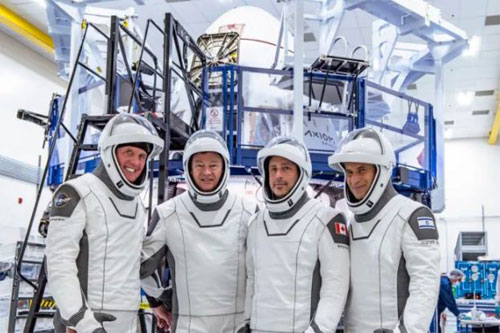A SpaceX rocket ship blasted off on Friday carrying the first all-private astronaut team ever launched to the International Space Station (ISS), a flight hailed by industry executives and NASA as a milestone in the commercialization of space flight.
The four-man team selected by Houston-based startup Axiom Space Inc for its landmark debut spaceflight and orbital science mission lifted off at 11:17 a.m. EDT (1517 GMT) from NASA’s Ken-nedy Space Center in Cape Canaveral, Florida.
Live video webcast by Axiom showed the 25-story-tall SpaceX launch vehicle – consisting of a two-stage Falcon 9 rocket topped by its Crew Dragon capsule – streaking into the blue skies over Florida’s Atlantic coast atop a fiery, yellowish tail of exhaust. Cameras inside the crew compartment beamed footage of the four men strapped into the pressurized cabin, seated calmly in their helmeted white-and-black flight suits moments after the rocket soared toward space.
About nine minutes after launch, the rocket’s upper stage delivered the crew capsule into its pre-liminary orbit, according to launch commentators. Meanwhile, the rocket’s reusable lower stage, having detached from the rest of the spacecraft, flew itself back to Earth and successfully touched down on a landing platform floating on a drone vessel in the Atlantic.
Launch webcast commentator Kate Tice de-scribed the liftoff as “absolutely picture-perfect.” One crew member could be heard telling mission control in a radio transmission, “That was a hell of a ride.”
If all goes as planned, the quartet led by retired NASA astronaut Michael Lopez-Alegria will arrive at the space station on Saturday, after a 20-hour-plus flight, and the autonomously operated Crew Dragon will dock with the orbiting outpost some 250 miles (400 km) above the Earth.
SpaceX, the rocket company founded in 2002 by billionaire Elon Musk, was directing mission control for the flight from its headquarters near Los Angeles.
NASA, besides furnishing the launch site, will assume responsibility for the astronauts once they rendezvous with the space station to undertake eight days of science and biomedical research while in orbit.
The mission, representing a partnership among Axiom, SpaceX and NASA, has been touted by all three as a major step in the expansion of commercial space ventures collectively referred to by insiders as the low-Earth orbit economy, or “LEO economy” for short.
Friday’s launch also stands as SpaceX’s sixth human space flight in nearly two years, following four NASA astronaut missions to the space station and the “Inspiration 4” launch in September that sent an all-civilian crew to orbit for the first time. That flight did not dock with ISS.
While the space station has hosted civilian visi-tors from time to time, the Ax-1 mission will mark the first all-commercial team of astronauts to use ISS for its intended purpose as an orbiting research labo-ratory.
The four-man Axiom team will be sharing the weightless work environment with seven regular, government-paid ISS crew members – three Ameri-can astronauts, a German astronaut and three Russian cosmonauts.
Lopez-Alegria, 63, the Spanish-born Axiom mission commander, is also company’s vice president for business development. His second-in-command is Larry Connor, a real estate and technology entre-preneur and aerobatics aviator from Ohio designated as the mission pilot. Connor is in his 70s but the company did not provide his precise age.
Rounding out the Ax-1 team are investor-philanthropist and former Israeli fighter pilot Eytan Stibbe, 64, and Canadian businessman and philan-thropist Mark Pathy, 52, both serving as mission specialists. The flight makes Stibbe the second Israeli in space, after Ilan Ramon, who perished with six NASA crewmates in the 2003 space shuttle Co-lumbia disaster.
The Axiom crew members may appear to have a lot in common with many of the wealthy passengers taking suborbital rides in recent months aboard the Blue Origin and Virgin Galactic services offered by billionaires Jeff Bezos and Richard Branson, respec-tively.
But Axiom executives said their mission goes far beyond space tourism, with each crew member un-dergoing extensive astronaut training with both NASA and SpaceX.
The Ax-1 team also will be conducting more than two dozen science experiments aboard ISS, including research on brain health, cardiac stem cells, cancer and aging as well as a technology demonstration to produce optics using the surface tension of fluids in microgravity, company executives said.
Launched to orbit in 1998, the space station has been continuously occupied since 2000 under a U.S.-Russian-led partnership including Canada, Japan and 11 European countries.
NASA has no plans to invest in a new space sta-tion once ISS is retired, sometime around 2030. But NASA selected Axiom in 2020 to design and de-velop a new commercial wing to the orbiting labora-tory, which currently spans the approximate size of a football field.
Plans call for eventually detaching the Axiom modules from the rest of the station when it is ready to be decommissioned. Other private operators are expected to place their own stations in orbit once ISS is out of service.
In the meantime, Axiom said it has contracted with SpaceX to fly three more private astronaut missions to the space station over the next two years.—Reuters










